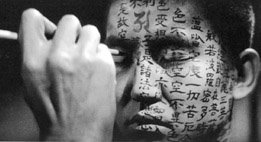Since You Asked
I think the classic definitions of the uncanny differentiate it from horror (and terror) as these are defined by one's physical responses to the object (whatever theories people have about the psychological sources of those feelings). The uncanny is both supernatural and disturbing or eerie--that is, one the one hand, it's defined by being inexplicable according to the ordinary operations of nature (thus, a rotting corpse is not uncanny though it may be an object of horror); on the other, by not being very nice (therefore miracles and God are not uncanny).
Freud's way of looking at the uncanny is interesting and very influential: It makes the familiar strange through some transformation that is generally to be explained as a psychological mechanism of defense, denial, alienation, and thus undermines our sense of the reality of reality, or ability to discern the real from the imagined, illusory, or subjective. Thus, typical uncanny themes are ghosts (much better when they are the ghosts of someone known); vampires (ditto, as they generally are in classic folklore); zombies (which confuse the categories or life and death); doppelgaengers (isn't that me? But I'm me!! Aaaaaagh!!!!). That's why my list tends to things like The Turn of the Screw, which are very decidedly ghost stories without necessarily being in the horror genre. Bartleby is interesting because, like Kafka and Borges, it skirts the issue of the supernatural. I am especially interested in situations where the uncanny effect is created not primarily by the device of a ghost, etc., but by a literary technique such as multiple points of view (as in Dracula or Rashomon), nesting of stories (as in The Manuscript Found at Saragossa), or weird narrative puzzles (as in Ubik). Personally, I think Stephen King is a very good writer of horror novels but only occasionally really interested in the uncanny, and then the effect is forced; Phillip K. Dick and Peter Straub are just deeply attracted to the uncanny. The title of Emmanuel Carrere's biography of Dick is pretty uncanny itself; at least it's extremely eerie: I Am Alive and You are Dead.
Unlike the basic category of the horror novel or film, the category of the uncanny fits pretty well with other things I teach, try to read up on, and hope to write more about: the nature of dreams; the theme of cannibalism in psychodynamics, esp. of childhood; and the identity issues posed by artificial persons in novels and film. On the latter, I think there's a lot in genuine philosophy and cultural theory lately, but very little that's psychodynamically oriented, so recognizing the continuity between , say, Blade Runner and Edgar Allan Poe on the living dead, automata, and doubles could be kind of interesting.





No comments:
Post a Comment